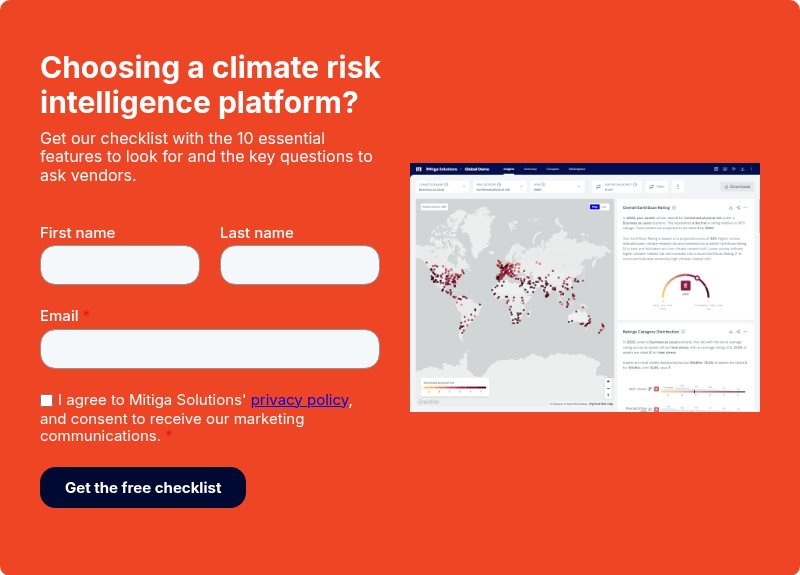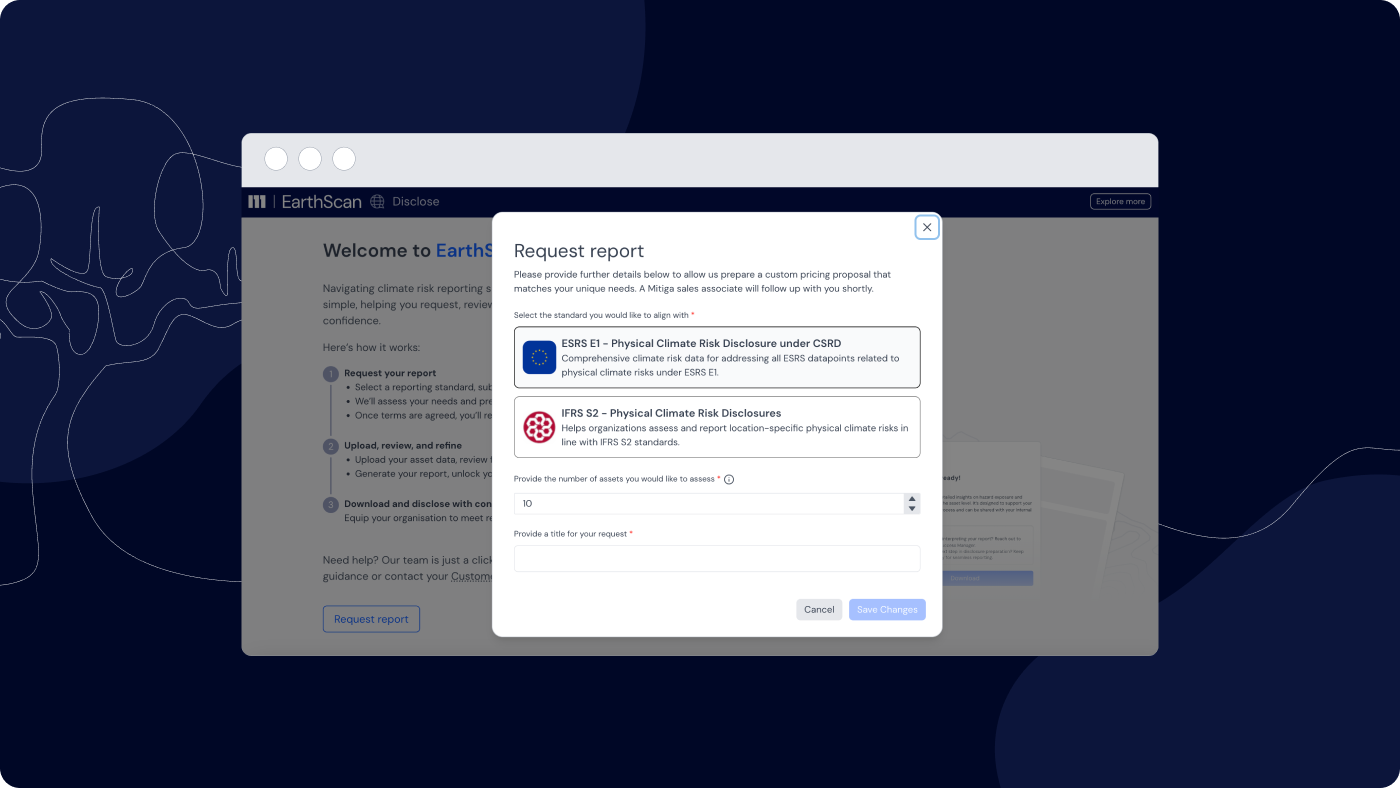In a world where climate impacts are already being felt, businesses are increasingly pressured to assess and mitigate risks associated with climate change. This challenge is particularly pronounced for asset management firms like Fengate, which oversee billions of dollars in investments spanning various sectors, from real estate to renewable energy.
Fengate is an asset management firm renowned for its strategic investments in critical infrastructure, energy utilities, and real estate. With over $9.5 billion in assets under management primarily in North America, Fengate plays a pivotal role in facilitating sustainable growth while ensuring robust returns for its investors.
However, amidst the escalating challenges posed by climate change, the need to assess and mitigate climate risks has become paramount for Fengate and similar firms. EarthScan works with asset managers and infrastructure investors to help them analyse, report and act on their exposure to climate change.
Integrating climate risk in investment processes
Della Wang, Fengate’s Director of ESG, emphasises the importance of integrating climate risk into their investment processes: "The goal for us is how do we treat these risks as a core part of the risk register. As we see climate risk is interdependent and oftentimes influences your legal, operational, and financial risks. So it cannot be evaluated in a silo."
Traditionally, evaluating climate risk for a specific asset when performing pre-transaction due diligence often required a costly and time-consuming engagement with a specialist consultancy firm. This does not scale to the needs of investment firms who often perform due diligence on an ongoing basis. For this reason, EarthScan offers a cost-effective and time-effective solution tailored to the specific needs of this type of investor. It enables Fengate to analyse and mitigate climate risks across their diverse portfolio, from the threat of flooding to extreme temperature fluctuations, ensuring the resilience of their investments in the face of climate uncertainties.
EarthScan has had a transformative impact on Fengate's investment strategy, noting a shift in their approach to due diligence. Previously focused primarily on decarbonization efforts, Fengate now integrates climate risk assessment seamlessly into their investment decision-making process. This enhanced diligence empowers Fengate to identify and mitigate potential risks proactively, safeguarding investments and fostering long-term sustainability.
Fengate leverages EarthScan throughout the entire investment lifecycle. This process begins at the screening and due diligence phase, where potential investments are evaluated for their exposure to climate risks. "We not only look at whether it has flooded in the past, we can look at whether it's exposed to potential flooding risks in 20, to 30, or 40 years," explains Della. This proactive approach ensures that climate risk is not only identified but also quantified and mitigated early in the investment process.
For example, Fengate recently evaluated two real estate properties outside their typical geographic scope. By using EarthScan, they discovered a heightened precipitation risk due to flash flooding. This led them to engage a stormwater management consultant and investigate whether existing adaptation measures were sufficient. "We take the coordinates of the locations of those potential investments, and we run it through EarthScan. What it'll tell us is not only an exposure rating, but also the underlying metrics related to those hazards," Della shares.
This thorough assessment process is not limited to new investments. Fengate also conducts regular climate risk assessments on existing portfolio assets to ensure they remain resilient over time. "We like to take advantage of the junctions where we have a dialogue around ESG data collection.
This happens annually," notes Della. By integrating these assessments into their regular ESG data collection cycles, Fengate ensures that their investments continue to meet both financial and sustainability goals.
Fengate’s Commitment to Sustainable Investment
Another key aspect of Fengate's strategy lies in its commitment to sustainable investments, particularly in renewable energy and critical infrastructure. In 2023, renewable energy investments reached $358 billion in the first six months alone, driven by the COVID-19 pandemic and the global energy crisis, according to The International Energy Agency’s World Energy Investment report.
As decarbonisation becomes inevitable, a study published in Nature revealed that fossil fuel assets worth $11tn-$14tn will become stranded by 2036. Meanwhile, returns from renewable energy investments (422.7%) were found to be more than 7 times the return on fossil fuels (59%) in the last 10 years. Additionally, solar and wind have long life spans of at least 15-20 years, making investments more profitable over time.
Given the long-lived nature of these assets, assessing and managing climate risk is not just a regulatory requirement but a strategic imperative for ensuring sustained value creation and operational resilience.
EarthScan plays a pivotal role in this endeavour, enabling Fengate to assess climate risks associated with potential investments rigorously. By leveraging EarthScan's insights, Fengate can navigate complex risk landscapes, making informed decisions that align with their sustainability goals and deliver value to investors.
A notable example of EarthScan’s application is in Fengate’s evaluation of real estate assets outside their typical geographic focus. By identifying heightened precipitation risks through EarthScan, Fengate engaged stormwater management consultants to assess existing adaptation measures and insurance coverage. This proactive approach ensures that climate risks are managed before they can impact asset performance, demonstrating how EarthScan’s insights translate into practical actions.
Similarly, for their renewable energy investments, particularly in solar assets, EarthScan has enabled Fengate to anticipate the effects of extreme temperatures on operational efficiency. For instance, in regions prone to heat stress, EarthScan’s data on potential temperature extremes allowed Fengate to ensure that their solar infrastructure could withstand temperatures up to 60 degrees Celsius. This foresight not only safeguards the asset's operational integrity but also ensures stable energy production even under adverse conditions.
EarthScan plays a crucial role in Fengate’s strategy by providing detailed, science-backed data that informs investment decisions. The platform’s ability to translate climate risk into tangible metrics, such as climate value at risk, bridges the gap between climate science and financial modeling. "EarthScan has sort of helped us in translating climate risk into, for example, climate Value at Risk. This is a great example of how you're bridging the gap between climate science and holding value or equity value," Della explains.
Looking ahead, Jon Liddell, Mitiga’s Customer Success Lead, said, “Fengate's commitment to leveraging EarthScan is an integral part of their investment process. As they explore expanding EarthScan's utilisation across various departments beyond sustainability.”
“Fengate aims to embed climate risk assessment seamlessly into their organisational framework. This forward-thinking approach not only enhances resilience but also fosters a culture of sustainability and innovation within the firm,” adds Jon.





